|
|
|
Sort Order |
|
|
|
Items / Page
|
|
|
|
|
|
|
| Srl | Item |
| 1 |
ID:
195373


|
|
|
|
|
| Summary/Abstract |
Drawing on recent debates in English School (ES) theory, this article develops an analytical framework for examining how states use multilateral institutions, or what ES theorists call ‘secondary institutions’, to reshape ‘primary institutions’, i.e. fundamental practices in international society. The framework highlights the role of states’ agency in international institutional change by shedding light on strategies that they employ to bring about changes in primary institutions. It posits that, although they can seek to directly remould primary institutions, states in practice often seek to bring about primary institutional changes through existing or newly formed secondary institutions and that this is especially the case at the level of regional international societies (RISs). The article demonstrates the utility of the framework by using it to analyse the case of Russia’s peacekeeping policy in the post-Soviet regional international society (PSRIS), focusing on its efforts to institutionalise the Collective Security Treaty Organization (CSTO) as an alternative ‘peacekeeping’ actor.
|
|
|
|
|
|
|
|
|
|
|
|
|
|
|
|
| 2 |
ID:
132170
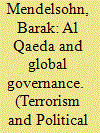

|
|
|
|
|
| Publication |
2014.
|
| Summary/Abstract |
In recent years, statements by al Qaeda leaders have included references to topics often associated with global-governance proponents' critique of the state. This article examines the organization's attitude toward symbols of global governance, giving particular attention to its view of the United Nations as the foundation for global governance, and to the manner in which al Qaeda approaches the central questions of environmental threats and human rights. The organization is seeking to insert itself into the discourse of global governance and use it in an instrumental manner; it focuses on anti-Western narrative and seeks to expose the existing order as designed by Western powers, particularly the United States, for self-serving reasons. However, the article argues, notwithstanding al Qaeda's reputation for sophistication in manipulating public opinion, the organization's references to global governance underscore the limitations its rigid ideology imposes on its messaging efforts. Even though adopting the global governance discourse is in line with the group's effort to improve its image, al Qaeda's extremist ideology limits its ability to take full advantage of the benefits this discourse offers.
|
|
|
|
|
|
|
|
|
|
|
|
|
|
|
|
| 3 |
ID:
185796
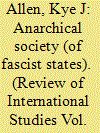

|
|
|
|
|
| Summary/Abstract |
While scholars within the English School have increasingly approached the traditionally liberal concept of solidarism in a normatively agnostic fashion, the idea of an ‘illiberal solidarism’ and historical manifestations thereof remain underexplored. One notable case in point surrounds the peculiar body of Italian interwar international thought, herein referred to as ‘international Fascism’. By discerning a synchronic outline of international Fascism, alongside the manner by which this project mutated and ultimately failed as it transformed from a vision theorised in the abstract to a practical initiative under the auspices of the Fascist regime, this article offers historical and theoretical insights into the realisability of illiberal forms of solidarism. Combining this historical account with theoretical insights derived from Reus-Smit's study on international order under conditions of cultural diversity, this article argues that the realisation of some form of solidarism necessitates the acceptance of a substantive pluralist component. Yet messianic illiberal visions that endeavour to retain the states-system, while simultaneously asserting the superiority of one community or a highly exclusionary vision of the ‘good life’, ostensibly lack the capacity to reconcile the contradictions inherent in efforts to universalise such projects.
|
|
|
|
|
|
|
|
|
|
|
|
|
|
|
|
| 4 |
ID:
165317
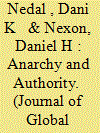

|
|
|
|
|
| Summary/Abstract |
Do international systems tend to remain anarchic because of recurring balances of power, or do they tend toward imbalances and hierarchy? Leading structural theories posit competing predictions about systemic outcomes, and the historical record offers evidence to support both claims. This suggests the need to theorize conditions under which one tendency or another is likely to dominate and what factors lead systems to transition from one state to another. We draw on constructivist and English School insights about international authority and legitimacy to develop such a framework. We conceive of patterns of international authority as structures independent from, and interacting with, mechanisms usually associated with international anarchy, such as the balance of power. We propose that international authority systems vary along two dimensions: particularist cosmopolitan and substitutable nonsubstitutable. Both are emergent properties of ideas and institutions located at the unit level. We argue that certain authority systems—particularist and nonsubstitutable—reinforce, and are reinforced by, anarchy and balanced distributions of capabilities. Others—cosmopolitan substitutable—facilitate rollup and domination and are likely to emerge or be maintained in hierarchic and highly asymmetric systems. By offering a structural account of international authority, we hope to contribute to the global turn in international relations, offering a framework for comparing systems across time and space. We also aim to help make sense of contemporary struggles over norms and values, their structural causes and consequences, and their potential implications for the future of global power politics.
|
|
|
|
|
|
|
|
|
|
|
|
|
|
|
|
| 5 |
ID:
078484
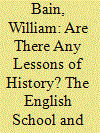

|
|
|
|
|
| Publication |
2007.
|
| Summary/Abstract |
This article explores what English School theorists claim for history in the study of international relations. The writings of Hedley Bull and Herbert Butterfield are examined with a view to providing an idealized though coherent distillation of the place historical enquiry enjoys in English School theory. The limitations of their respective positions, which cannot fully sustain the English School claim that historical knowledge is important in understanding international relations, are addressed by turning to Michael Oakeshott's conception of history as fable. The article concludes by reaffirming the place English School theorists give to historically informed theory by, paradoxically, denying to history any didactic character and therefore any practical relevance. For it will become evident that a didactic history - and whatever lessons it offers - is an illusion made in the present for the present, which is neither historical nor instructive
|
|
|
|
|
|
|
|
|
|
|
|
|
|
|
|
| 6 |
ID:
153241
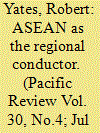

|
|
|
|
|
| Summary/Abstract |
This paper analyses ASEAN's prominence in regional order negotiation and management in Southeast Asia and the Asia-pacific through the lens of social role negotiation. It argues that ASEAN has negotiated legitimate social roles as the ‘primary manager’ in Southeast Asia and the ‘regional conductor’ of the Asia-Pacific order. It develops an English School-inspired role negotiation framework and applies it to three periods: 1954–1975 when ASEAN's ‘primary manager’ role emerged from negotiations with the USA; 1978–1991 when ASEAN's role was strengthened through negotiations with China during the Cambodian conflict; and 1991-present when ASEAN created and expanded the ‘regional conductor’ role. Negotiations during the Cold War established a division of labour where great powers provided security public goods but the great power function of diplomatic leadership was transferred to ASEAN. ASEAN's diplomatic leadership in Southeast Asia provided a foundation for creating its ‘regional conductor’ role after the Cold War. ASEAN's ability to sustain its roles depends on maintaining role bargains acceptable to the great powers, an increasingly difficult task due to great power rivalry in the South China Sea.
|
|
|
|
|
|
|
|
|
|
|
|
|
|
|
|
| 7 |
ID:
146455
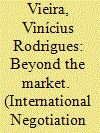

|
|
|
|
|
| Summary/Abstract |
Negotiators expect the World Trade Organization (WTO) to be an arena for states to pursue their material gain. However, the WTO also reflects symbolic aspects of international politics, in particular the notion of multilateralism. Although such a principle, in part, expresses Western dominance, Global South states have also benefited from multilateral regimes, and thus have incentives to legitimize them and behave according to their rules. Will the pattern of multilateralism change as other trade arrangements potentially gain more prominence? This article analyzes actions taken by Brazil and India in WTO’s Doha Development Agenda (DDA) and concludes that the multilateral system of trade will survive as Global South states participate in the organization to seek not just material gains but also to commit themselves to the international normative dimension.
|
|
|
|
|
|
|
|
|
|
|
|
|
|
|
|
| 8 |
ID:
123145
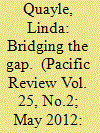

|
|
|
|
|
| Publication |
2012.
|
| Summary/Abstract |
The objective of a 'people-oriented' Association of Southeast Asian Nations (ASEAN) has not readily translated into easy relations between the Association and regional civil society. Discourse inspired by global civil society has found plenty to focus on in the gap between aspiration and practice. This article argues, however, that not enough attention has been directed to the bridges that are gradually forming across that gap, and suggests that an 'English School'-derived account can give a fuller picture of what is under way in this area. From this perspective, a process of institutionalization is observable among the different actors. By tackling - consciously or unconsciously - core problems such as recognition, location of common ground, confidence-building, and burden-sharing, this process is potentially transforming the relations of a state-imposed hierarchy into something more societal. The usefulness of such an approach lies in its ability to describe a process of slow change on its own terms, to normatively validate the fragile bridges under construction, and to stake out possibilities for progress on the basis of negotiation and accommodation.
|
|
|
|
|
|
|
|
|
|
|
|
|
|
|
|
| 9 |
ID:
087583
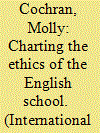

|
|
|
|
|
| Publication |
2009.
|
| Summary/Abstract |
This article aims to advance our understanding of the development of English School thinking on international ethics by outlining three phases of ethical inquiry within the British Committee. The article argues that, throughout the life of the Committee, its outlook was conditioned by a pervading moral skepticism, which was reflected in the School's commitment to a "middle-ground ethics"; however, at various times the Committee members' views changed about how maximalist the "good" could be that oriented this ethical position. Awareness of this ebb and flow helps us better understand Hedley Bull's characterization of the ethics of pluralism and solidarism within the School as well as the precise challenge contemporary English School theorists face if they are to move beyond the normative cul-de-sac that British Committee members encountered in each phase of their ethical discussions.
|
|
|
|
|
|
|
|
|
|
|
|
|
|
|
|
| 10 |
ID:
151220
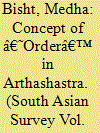

|
|
|
|
|
| Summary/Abstract |
Going beyond the binaries of Western and non-Western, this article lays out a conceptual–analytical frame for understanding ‘order’ in international relations (IR). What does ‘order’ mean? What are its key characteristics? How is the conventional ‘Western’ understanding different from or similar to the understanding advanced in Arthashastra ? These are some questions that this article seeks to address. The article picks up the discussion on English School of IR, juxtaposing it with Kautilya’s Arthashastra . The indicators chosen for this more revisionist interpretation of the text are ‘operative principles’, ‘code of conduct’ and ‘structures’. It is argued that the Kautilyan concept of order is broadly normative whereby norms were stipulated by the dharmashastras . Thus, underlining the distinct cultural and contextual undertones, the article emphasises that the normative underpinnings of ‘order’ in Arthashastra have to be read within the existing philosophical frames of the Hindu tradition. The cognitive–cultural frame of understanding orders perhaps best suits the purpose.
|
|
|
|
|
|
|
|
|
|
|
|
|
|
|
|
| 11 |
ID:
110780
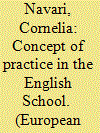

|
|
|
|
|
| Publication |
2011.
|
| Summary/Abstract |
The English School concept of practice is what Stephen Turner in The Social Theory of Practices calls a 'telic' notion. A telic practice is an activity seeking a goal 'which is conceived as a result of following certain general principles of procedure'. Examples of telic practices are playing a game of chess, holding a seminar, baptizing a baby or going fly-fishing. Such practices are carried out according to standards of excellence set forth in some tradition of interpretation. Maurice Keens-Soper has placed de Caillèires' De la maniere de negocier avec les souverains in a tradition of interpretation applied to diplomacy, and one that set standards. A practice in the English School sense is not a private idea: a commitment to communal standards is required if one is to talk meaningfully of a practice. A telic notion of practice may be contrasted with a causal notion. In the causal notion, a practice is a form of mentalist 'object' which impinges on behaviour. Pierre Bourdieu (1977), for example, is interested in practices as hidden convictions or habits shared by a group; his 'habitus' informs social action. Either as a kind of presupposition, or as a kind of mental trace, a practice in the causal sense disposes thought or action in a certain way. In this form, practices are not directly accessible, their existence must be inferred, and the means of accessing them are fraught with difficulties. A person engaging in a telic practice is guided by its standards rather than being caused to perform, and telic practices are directly accessible to empirical investigation.
|
|
|
|
|
|
|
|
|
|
|
|
|
|
|
|
| 12 |
ID:
155149
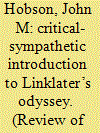

|
|
|
|
|
| Summary/Abstract |
This article provides an ‘engaged’ introduction to this forum on Andrew Linklater’s recently published book, Violence and Civilization in the Western States-Systems. I call this ‘engaged’ because I seek to adjudicate between the critics and Linklater’s book in the hope of building a bridge over troubled water. Given that the key word that underpins many of this forum’s contributions is Eurocentrism, I explore whether, and if so to what extent, Linklater’s book is Eurocentric. While I too identify various Eurocentric cues, I also provide various defences for Linklater. In particular, the final section advances two definitions of Eurocentrism and anti-Eurocentrism. Although I identify elements of ‘Eurocentrism I’ (the elision of non-Western agency and reification of the West) in his book, Linklater might respond to the principal forum complaint that he accords little or no role to non-Western actors and processes in the Western or global civilizing process by appealing to an alternative anti-Eurocentric approach: ‘anti-Eurocentrism II’ (which focuses squarely on Western imperial power and ignores or heavily downplays non-Western agency). I close by critiquing his left-liberal cosmopolitan politics, arguing that his Eurocentric-universalist normative posture cannot create the kind of peaceful and harmonious world that he (and Kant) so desires.
|
|
|
|
|
|
|
|
|
|
|
|
|
|
|
|
| 13 |
ID:
095261
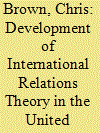

|
|
|
|
|
| Publication |
2009.
|
| Summary/Abstract |
British International Relations Theory (IRT) is distinguished by a concern with institutions and norms, and by an emphasis on history, philosophy and law rather than the formal methods of the social sciences. In both respects, but especially the latter, it differs from American IRT. The origins of British IRT are traced and the importance of the 'English School' is stressed partly because of the work it stimulates but also because of its role as a brand, which helps to establish the independence of British International Relations (IR) from the otherwise dominant American IR. Along with the English School scholarship (pluralist and solidarist), work on Political Theory and IR, and Critical Theory, including Critical Security Studies, are the major areas where contemporary British IRT is located. The article argues that this trend is likely to persist, but the generally critical approach taken to social scientific theorizing may be changing, with the increasing importance of historical sociology and critical realist work. It may also be the case that the privileged status of IRT in British IR may be under challenge
|
|
|
|
|
|
|
|
|
|
|
|
|
|
|
|
| 14 |
ID:
110203
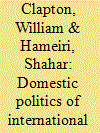

|
|
|
|
|
| Publication |
2012.
|
| Summary/Abstract |
Recent work has identified new hierarchical relationships within international society. However, few scholars have provided a satisfactory account of what informs their formation, reproduction or constitutional effects for international society. We argue that underpinning the emergence of a more hierarchical international society is a new social logic of risk, which constructs illiberal and/or fragile states as potentially dangerous sites of instability and disorder that pose particular security risks for Western states. We proceed to argue that such risk-based hierarchies are transformative of both inter-state and intra-state relations, by stripping equal political agency from 'risky' actors within and without the state. We demonstrate these claims by drawing on examples of international state building in Southeast Asia and the Southwest Pacific.
|
|
|
|
|
|
|
|
|
|
|
|
|
|
|
|
| 15 |
ID:
131992
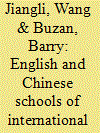

|
|
|
|
|
| Publication |
2014.
|
| Summary/Abstract |
This article compares the academic histories of the so-called 'Chinese School' and the English School in the six dimensions of origin, founders, and organization; naming; context; aims/intentions; theory sources; and historical projects. The English School is mature enough to present fairly clear contents for each section, but as the Chinese School is much newer and still hotly contested as a concept, many things about it are uncertain and controversial; it lacks a single defining concept or frame. The opportunity at hand, therefore, is to apply the experience of the English School to the formative process of a Chinese School or schools, at the same time making clear the considerable differences that time, place and circumstance make to the two projects. The article concludes by looking at possible lessons for the development of International Relations (IR) theory in China, both from what the English School has accomplished and for which it has been criticized. Along the way we provide a bibliographical introduction to both projects.
|
|
|
|
|
|
|
|
|
|
|
|
|
|
|
|
| 16 |
ID:
138069
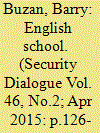

|
|
|
|
|
| Summary/Abstract |
The terms ‘English School’ (ES) and ‘international security’ seldom appear in the same sentence. Yet the ES can and should constitute a general approach to International Security Studies (ISS) comparable to realism, liberalism, constructivism and several other approaches to International relations (IR). The article begins by sketching out how the ES’s idea of raison de système provides a general framing for ISS that counterpoints approaches focused on raison d’état. It then shows how the ES’s societal approach provides specific insights that could strengthen analysis of international security: by providing a normative framing for securitization; by showing the historical variability of key ISS concepts such as war, balance of power and human rights; by adding an inside/outside dimension to security relations based on differentiations within international society; and by complementing regional approaches to international security with its societal approach. The article aims to initiate a conversation between the ES and ISS by showing where the fruitful links are, and by introducing the relevant ES literature to ISS scholars.
|
|
|
|
|
|
|
|
|
|
|
|
|
|
|
|
| 17 |
ID:
177602
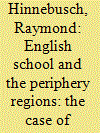

|
|
|
|
|
| Summary/Abstract |
The English School famously established the existence of an International Society. The first generation of ES scholars (Bull 1995) demonstrated, as against rationalist approaches such as realism, that IS matters for world politics and identified its dominant institutions, with sovereignty often seen as the master institution. Institutional change was chiefly addressed first in ES work on the export of Westphalian sovereignty to the non-Western world (Bull and Watson 1984) and later in debates over the impact of the global diffusion of Western ‘World Society’s’ liberal norms (eg, human rights) on sovereignty-centric IS. Notably, Buzan (2004) and his collaborators argued that, while a ‘thin’ sovereignty-centric IS had been globalized, regions retained distinctive packages of institutions resistant to normative homogenization
|
|
|
|
|
|
|
|
|
|
|
|
|
|
|
|
| 18 |
ID:
177601
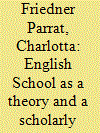

|
|
|
|
|
| Summary/Abstract |
It is becoming customary to define the English School (ES) as a group of scholars participating in a common inquiry related to a few central concepts, notably that of international society (Dunne 1998; Buzan 2001; 2004). Although the roots of the ES are often attributed to the British Committee on the Theory of International Politics (Dunne 1998; Vigezzi 2005; Navari 2009), it is now said to be more of an open society of impersonal ties rather than an exclusive community based on personal relations (Buzan 2004, 110–111). But how true is that assertion? If the School is theoretically open to anyone, why are its members predominantly male, white and Western?1 In this piece, we discuss three obstacles that prevent the ES from becoming a more inclusive venture.
|
|
|
|
|
|
|
|
|
|
|
|
|
|
|
|
| 19 |
ID:
117453
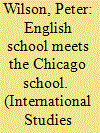

|
|
|
|
|
| Publication |
2012.
|
| Summary/Abstract |
The concept of primary international institutions is a core idea of the English School and central to those scholars from Bull to Buzan who have sought to take it in a more sociological direction. Yet the English School has traditionally found it difficult to define and identify with consistency the institutions of international society. A group of scholars, here called the "new institutionalists," have recently sought to address this problem by devising tighter definitions and applying them more rigorously. But different understandings and lists of institutions continue to proliferate. The source of the problem is the reliance on "stipulative" definitions, drawn from an increasingly abstract theoretical literature. The problem is compounded by the new institutionalists' employment of social structural and other "outsider" methods of social research. This article argues that it is only possible to empirically ground institutions, a task on which all agree, by returning to the interpretive "insider" approach traditionally associated with the school-but employing it in a much more rigorous way. To this end it makes the case for a "grounded theory" of international institutions inspired by Chicago School sociology.
|
|
|
|
|
|
|
|
|
|
|
|
|
|
|
|
| 20 |
ID:
088558
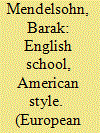

|
|
|
|
|
| Publication |
2009.
|
| Summary/Abstract |
This article addresses criticism that the English School fails to test empirically the validity of its main claims. The article takes a neglected yet highly significant aspect of the international society, its preservation-seeking quality, and tests it. It hypothesizes that if the international society truly exists and is inclined to act in order to guarantee its survival, its members should respond to threats to the existence of the society with rigorous collective action atypical of `normal politics'. To validate the hypothesis, the article examines the way in which members of the international society have responded to the systemic threat posed by the al Qaeda-led jihadi movement, focusing on the regime to suppress the financing of terrorism. Subsequently, the article lauds the theoretical contribution of the English School to understanding systemic threats, as well as its unique exposition of the war on terrorism.
|
|
|
|
|
|
|
|
|
|
|
|
|
|
|
|
|
|
|
|
|